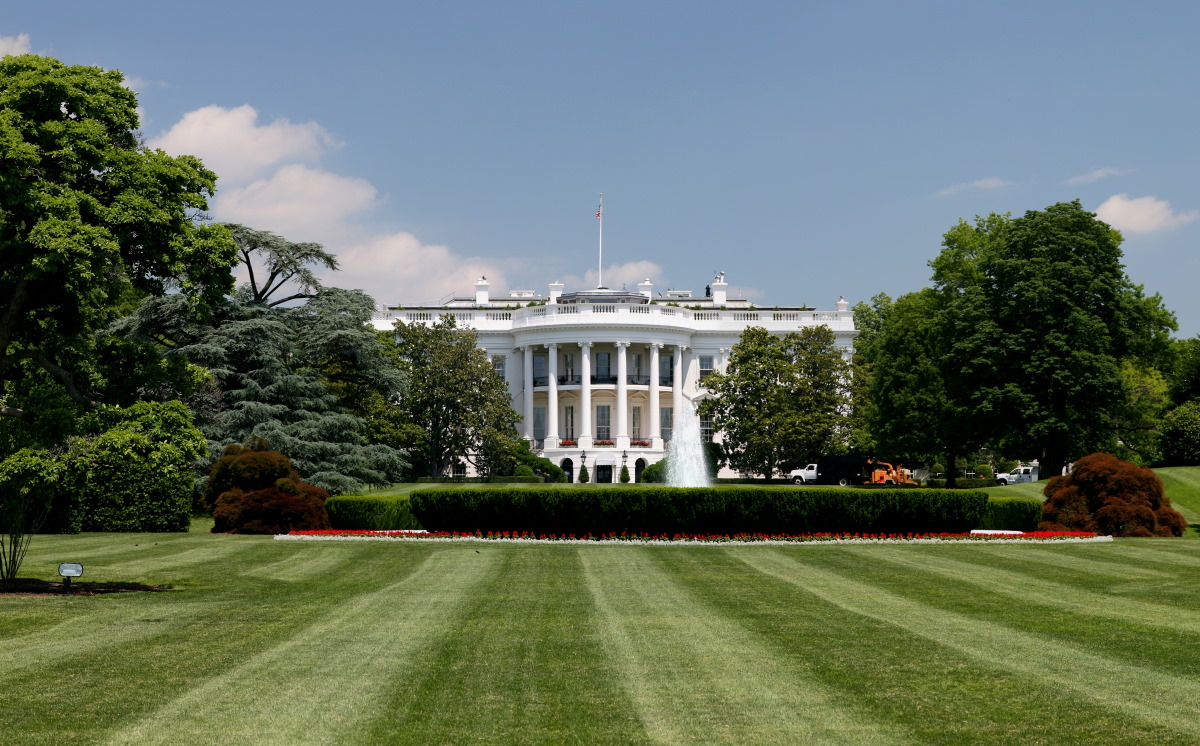Climate change and related energy issues seemed to be in place to play a historically prominent role in the 2020 campaign. Then came the pandemic, economic turmoil and a renewed debate over racial justice.

The White House as seen from the South Lawn.
Early this year there were strong signs in polls and otherwise that climate change could play a bigger role in this year’s presidential election than ever before, perhaps a top-tier role. But then came two unexpected developments with huge impacts on the political landscape.
The coronavirus pandemic unleashed an ever-mounting toll of illness, death and economic disruption. And George Floyd’s death catalyzed a wrenching shift of national focus to racial injustice.
But any speculation that these developments might be so dominant that they would erase climate’s place on the roster of top presidential issues may prove to have been wrong. As the Democrats prepared to meet this week in their virtual convention to nominate Joe Biden and Kamala Harris, climate change and related energy issues still loomed very large – maybe historically large – as the 2020 race for the White House entered the home stretch.
Climate action was among the handful of issues emphasized by Biden and Harris when he announced her selection as his running mate. Coverage of Harris’ own history of policy positions has often stressed her championing of environmental justice concerns. The Democrats will campaign on a platform that includes an attack on climate change that Biden announced last month. The Washington Post called it “the most ambitious [climate] blueprint released by a major party nominee for president.”
That blueprint calls for eliminating electric power plants’ climate-disrupting pollution by 2035; rejoining the Paris Climate Agreement that Donald Trump abandoned; and spending $2 trillion to advance renewables along with less polluting vehicles, residences and other buildings. Britain’s Financial Times newspaper said those actions would mark an epochal reorientation for the United States, economically and socially – “a root-and-branch overhaul of the American energy system that will put climate change at its heart.”
Trump famously scoffed at climate science and worries about climate change both before and after his 2016 election. He is running for reelection as a champion of the very climate-disrupting fossil fuels that Biden promises to diminish with aggressive and sweeping action. Trump has recently underscored his position, forcefully established during more than three years of rolling back environmental regulations.
Among the president’s latest reminders of where he stands: He traveled to the oil-and-gas-rich Permian Basin of Texas three weeks ago to declare that if Biden wins, the state will no longer produce any energy. (The Associated Press flatly labeled that claim as “unsubstantiated” with good reason. Even if all oil and gas production ended, Texas is the No. 1 wind-energy state.) In recent days, Trump’s administration has taken final action to adopt two more dramatic regulatory changes – rescinding Obama-era rules limiting oil and gas operations’ emissions of methane, an extremely potent greenhouse gas, and opening Alaska’s Arctic National Wildlife Refuge for oil and gas drilling. Access to the refuge is something that the industry has sought but wilderness advocates had blocked for 60 years.
Climate may yet recede to its usual secondary (or lower) status in the campaign’s final weeks. The slight attention it received in the highly orchestrated Democratic convention’s first two days annoyed some climate-action advocates. But then young climate activists were given a turn in the spotlight and New Mexico Gov. Michelle Lujan Grisham gave a speech contrasting her state’s commitment to “a renewable energy future” to Trump’s fossil-fuel record as an example of how to show “climate leadership.”
Then Biden himself led off his acceptance speech by identifying the “four historic crises” that the nation faces now, “all at the same time.” His list: “The worst pandemic in over 100 years. The worst economic crisis since the Great Depression. The most compelling call for racial justice since the ’60s. And the undeniable realities and accelerating threats of climate change.” Climate change, he briefly added later, is “not only a crisis, it’s an enormous opportunity…for America to lead the world in clean energy and create millions of new good-paying jobs in the process.”
The other three crises Biden cited are clearly much on Americans’ minds, receiving enormous news coverage. Pollsters have found a decline in public identification of climate as a top issue in recent months. It may turn out that the Democratic convention’s fairly frequent, but not lengthy, attention to climate anticipates a pattern in the rest of the presidential race. For his part, Trump has returned to a pithy line he has leveled at Democrats since last year – that Biden and Harris “don’t like oil, guns or religion.”
Regardless of the issue’s prominence in the lead-up to Nov. 3, Trump-versus-Biden poses a stark decision, especially for Texans. Texas Climate News was launched nearly 12 years ago because Texas is at the very heart of the climate issue. It’s a global center of the oil and gas industry, the leading U.S. producer of wind energy, and a geographic bull’s-eye for severe climate-change impacts.
In the weeks ahead, TCN will be illuminating the choices that Texas voters face in the presidential race and other election contests.
+++++
Bill Dawson is the founding editor of Texas Climate News.
